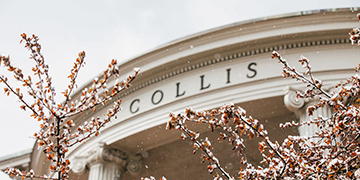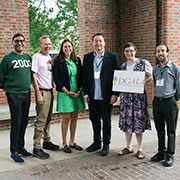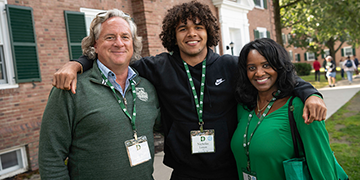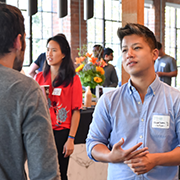Fueled by a “Sense of Fearlessness”
First-generation student Julia Hill was an experienced researcher, entrepreneur, and published academic journal author before completing her undergraduate degree.
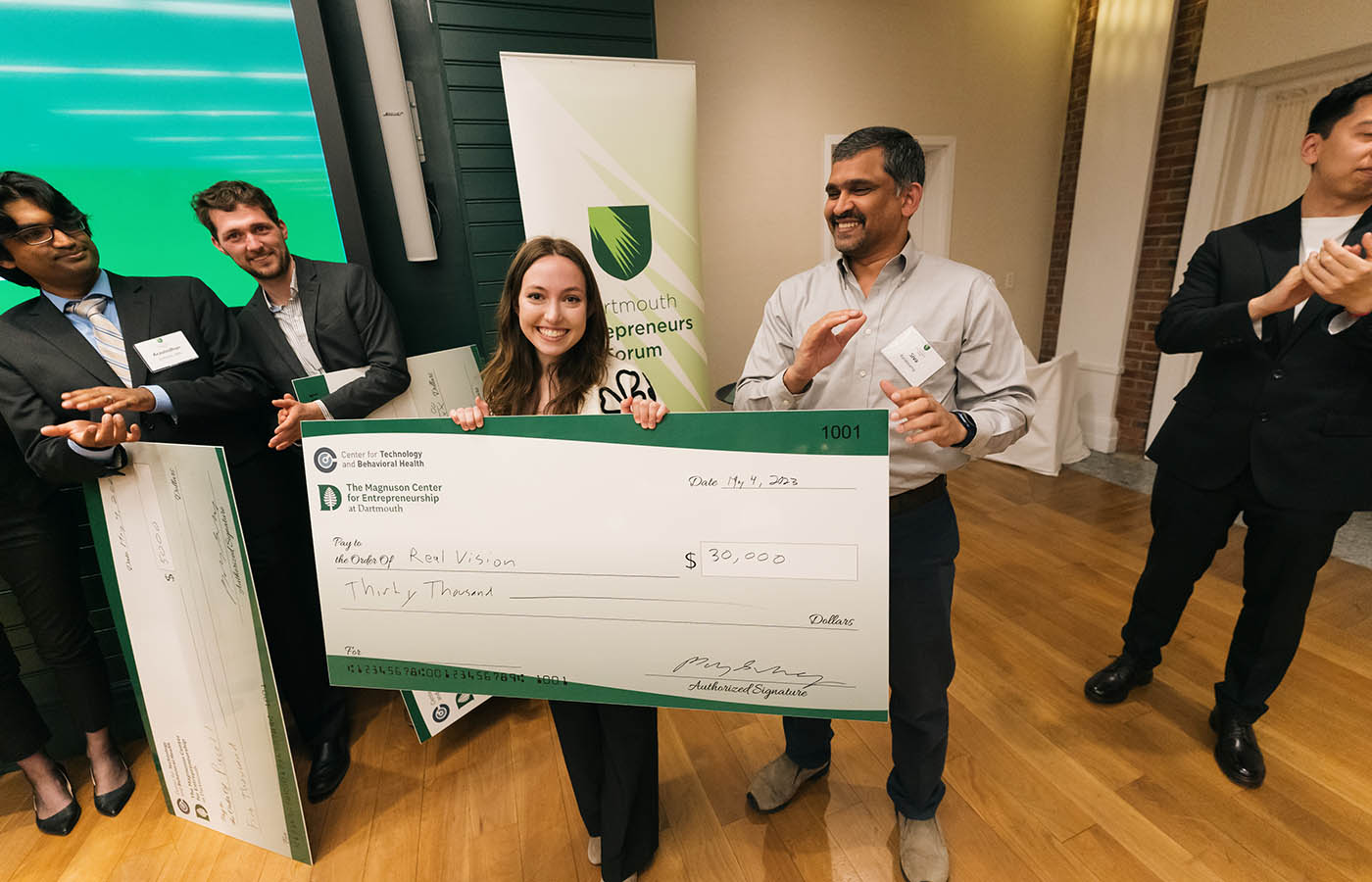
Nov 21, 2024
6 minute read
6 minute read
Julia Hill ’24 may well represent what a modern Dartmouth education looks like: In addition to exploring the traditional liberal arts, as an undergraduate she developed her coding skills, participated in research with real-world applications, authored articles published by academic journals, and became an entrepreneur, all while working toward her ambition of attending medical school.
Many people made Hill’s Dartmouth experience possible, and nobody had a greater impact than Karen Fortuna, an assistant professor of psychiatry at the Geisel School of Medicine.
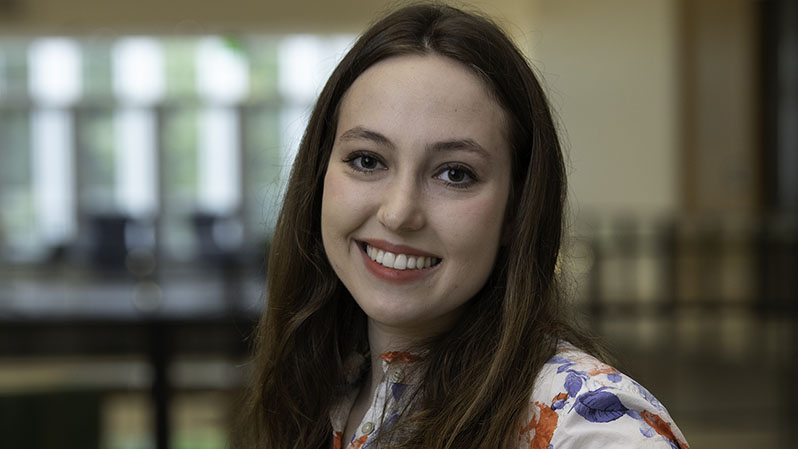
Among many Dartmouth students, Fortuna is known as a mentor who welcomes first-generation students like Hill into her lab. Fortuna has up to 10 students working in her lab each year, including master’s students and PhD candidates, and typically more than three-quarters of them are first gen.
Working with partners across the Dartmouth campus, Fortuna and Hill are developing an app called RealVision to detect symptoms of disorders such as Alzheimer’s disease and related dementias by tracking how individuals use their smartphones. Last year, Fortuna and Hill participated in a pitch competition—with Hill making the final presentation solo—that won $30,000 toward the app’s development. “Julia comes with grit and dedication,” says Fortuna. “I don't know what Julia is going to do in this world, but it’s going to be spectacular.”
Here, the pair talk about Hill’s Dartmouth journey, Fortuna’s desire to mentor first-generation students, and the power of collaboration.
Hill: I chose Dartmouth because students talked about it being a place where it’s easy to collaborate, and that’s what I found when I came here. Even among the pre-meds, which you would think is highly competitive, I have people coming up to me saying, “Hey, let’s work on this problem together.” By the time I graduated, I had collaborated with people in Thayer and Tuck, which I had never imagined. I didn’t think of myself as a businessperson, but it’s not about being a businessperson. It’s about working in a team that has all of these different attributes.
I got involved in the Women in Science Project in my first year through Alireza Soltani’s lab, which was an enriching experience. I developed my coding skills, even though I’m not a coder, just like I’m not a businesswoman. I ended up doing some projects for them regarding cognition and learning research. It was interesting work, but I realized that I wanted a more human-to-human aspect.
Fortuna: Julia first reached out to me at the suggestion of an alum. She cold-called, and I love that sense of fearlessness. A lot of students wouldn’t do that. Sometimes there are advantages to being first gen. Instead of being taught by your parents, “Here’s the pathway you need to follow,” you create your own pathways.
I grew up with a father who had a really rare, progressive form of multiple sclerosis, where he went from a successful business owner to a man who used a cane, a walker, and a wheelchair over a course of one year. Despite all of that, he went back to school and was the first person in my family to get his bachelor’s degree. At his graduation ceremony, he looked down at me and he said, “Kar, I did this to show you that you can do anything in life despite massive challenges.” So when I meet first-gen students, I know there often have been major challenges in their lives, and I’m here to help them despite any and all challenges.
Hill: Karen is an awesome mentor. She let me lead a lot of my own projects. She provided me with opportunities to be first author on journal articles. She provides a foundation for every individual coming into her lab.
Fortuna: Nobody comes into the lab and immediately becomes lead author on a journal submission or immediately leads a study. We have a system in place where, most commonly for the first six months, individuals are writing a paragraph here and there on a certain manuscript. Then we start talking, and I ask, “What type of project would you like to do?” I do a mentored principal investigator approach. The students are in charge, but we are talking all the time about everything—data collection, analysis, how to write papers. Eventually, they can get first authorship. Julia broke all the systems in place and jumped right in. After three months, she was leading her own project.
Hill: My research experience has really shaped who I am as a person. Karen has given me constant feedback to help me connect with different individuals. You want to connect with patients meaningfully, and then maybe you take a different approach when you’re speaking to an audience of investors. Karen does a great job of balancing personability with professionalism while adapting to each person.
Fortuna: When Julia was preparing to make the final pitch for the RealVision app at the Innovation Accelerator for Digital Health competition, I was telling her, “You’re not supposed to be here so soon. But guess what? You are. You have nothing to lose. That puts you at a huge advantage.”
Hill: My career plans have definitely been shaped by participating in boots-on-the-ground work. For example, when volunteering with Dartmouth Generations, I went into residential communities with my undergraduate peers and got to know people with dementia. I learned patients’ priorities to put them first in my research. With the lab, we also worked in Harlem and the Bronx with a nonprofit called the Bridge serving people with serious mental illness or opioid use challenges. We developed an older adult peer-supported intervention to support successful aging in a population with a high rate of premature nursing home placement. We developed this intervention with older adults who have mental health challenges as our partners.
Fortuna: This is the humanistic approach to science, in that a community reaches out to the lab and says, “I have this issue in my community that I want to address.” We partner with the community and develop technology-based interventions to serve them. The community takes the lead, while the lab employs rigorous scientific methodology to support their efforts.
Hill: Physicians already have a high burden due to patient volume, and our population is aging. That’s just a reality. With my interest in geriatric psychiatry, I know my volume of work is going to be massive. I want to have the satisfaction of treating each individual, but I also want to have a bigger impact than that. My lab experience has provided me a wonderful foundation for understanding the ways in which we can partner with communities and individuals with lived experience of mental health and/or physical health challenges. We can help prepare these individuals to become trained peer supporters to provide effective, empowering support where people live, work, and play. In that way, we can uplift the community as a whole to make sure everybody’s being served.
Related Reading
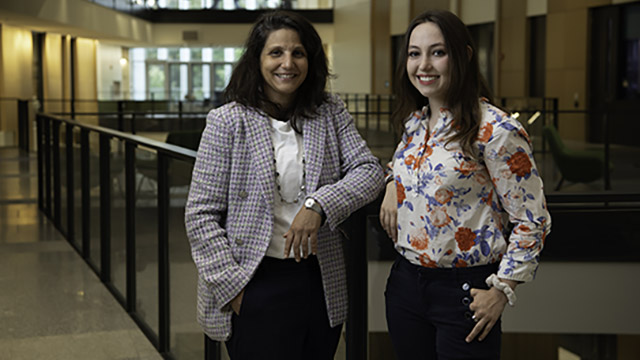
Researchers Harness the Power of Smartphones to Identify Symptoms of Early Dementia
Karen Fortuna, an assistant professor of psychiatry at the Geisel School of Medicine and Julia Hill ’24 are spearheading development of a smartphone app designed to slow the progress of diseases such as Alzheimer’s with earlier intervention.
4 minute read


